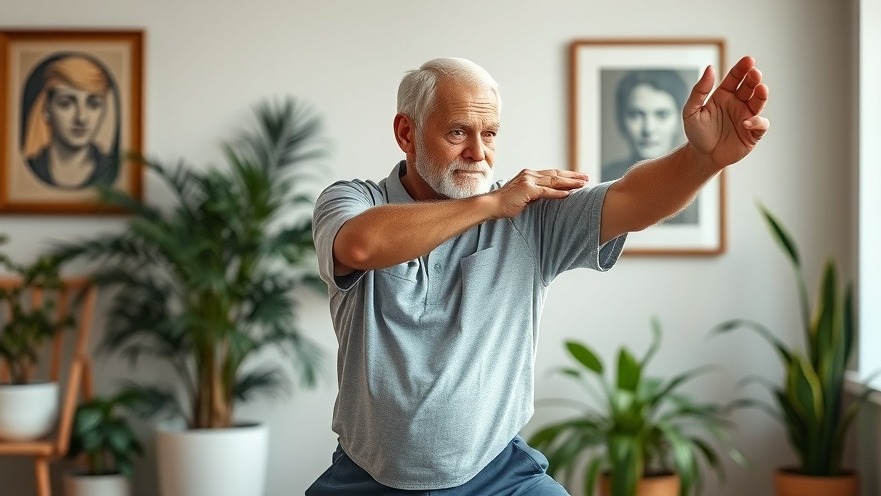
How Your Smartphone is Impacting Your Breathing and Overall Well-being
In our digital age, smartphones have become essential tools for communication, organization, and entertainment. However, many people overlook how the frequent and sometimes obsessive use of these devices affects their health, specifically breathing patterns. The insightful video, 'Your Smartphone Is Crippling Your Breathing – Fix It in Seconds!' sparked a realization about the significance of our devices not only in our daily routines but also in our physical well-being.
In 'Your Smartphone Is Crippling Your Breathing – Fix It in Seconds!', the discussion dives into the health impacts of technology use, exploring key insights that sparked deeper analysis on our end.
The Hidden Risks of Poor Breathing Habits
When we spend prolonged periods hunched over our phones, we often fail to engage in deep, diaphragmatic breathing. Instead, we may restrict our lungs, leading to shallow breaths that can negatively impact oxygen flow in our bodies. This change can also exacerbate conditions like anxiety and stress, particularly crucial aspects of mental wellness for seniors. Understanding the connection between our posture and breathing is essential for improving not only physical well-being but also cognitive health in aging.
Quick Breathing Techniques to Counteract Smartphone Use
To help alleviate the potential harm caused by poor smartphone posture, simple breathing exercises can be beneficial. A deep breathing exercise can be performed anywhere and can help restore balance and calm. Here’s a quick technique:
Find a comfortable seated position, ensuring your back is straight.
Place one hand on your chest and the other on your abdomen.
Inhale deeply through your nose, allowing your abdomen to rise while keeping your chest still.
Exhale slowly through your mouth, feeling your abdomen fall.
Repeat for a few minutes.
This exercise, when practiced regularly, not only improves lung function but also serves as a mindfulness technique, helping to manage stress and anxiety levels.
Benefits of Mindfulness and Relaxation Techniques
Using mindfulness exercises for seniors can significantly enhance your overall mental wellness. Incorporating activities such as yoga for mental wellness, tai chi for relaxation, or even deep sleep meditation practices can cultivate a more tranquil state of mind. Mindfulness has been shown to improve sleeping patterns, further underscoring the importance of creating comfortable spaces for slumber and relaxation.
The Importance of Sleep Hygiene for Older Adults
Sleep hygiene is critical, especially for older adults who might struggle with sleep disorders or issues stemming from mental health concerns. Creating a bedtime routine, which might include calming activities before bedtime and avoiding screen time, can greatly improve sleep quality. Implementing strategies such as guided imagery for sleep or listening to music therapy for relaxation can promote deeper sleep and aid in anxiety management for retirees.
Real-Life Impact: Personal Anecdotes
Consider the story of George, a retired teacher in his 70s, who found himself increasingly anxious at night, checking his phone multiple times before bed. After realizing that this habit negatively impacted his sleep and thus his cognitive health, he incorporated relaxing evening rituals, such as reading and practicing gratitude. He noticed significant improvements in both his mood and overall mental wellness.
Strategies to Combat Loneliness and Stress Among Seniors
Loneliness and isolation are struggles many seniors face, affecting both their mental and physical health. Engaging socially through community events or online platforms can serve as a counterbalance. Regularly checking in with family members or joining support groups for mental health are effective ways to cultivate connections, reducing feelings of isolation that can interfere with sleep and wellbeing.
Natural Remedies for Better Sleep and Anxiety Management
As we explore the intersection between technology use and mental wellness, it’s crucial to highlight the value of natural remedies. Herbal teas like chamomile or supplements such as magnesium can assist in calming the mind and promoting better sleep. Probiotics and omega-3s have also been linked to improved mental health in seniors, showcasing the diverse options available to those seeking alternative avenues for relief.
Conclusion: Taking Charge of Your Health
With technology shaping our interactions and lifestyles, it’s essential to prioritize our well-being. Embracing simple breathing techniques, good sleep hygiene, and mindfulness can significantly mitigate the effects of smartphone use and enhance overall health. Remember, it’s never too late to adopt practices that foster longevity and mental clarity.
Maximize your health by incorporating these ideas into your routine. Take the first step today!
 Add Element
Add Element  Add Row
Add Row 




Write A Comment